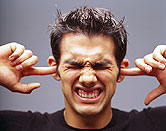MP3 Players May Be Major Source of Hearing LossStudy of New York City commuters found 90 percent to be at risk of ear damage.By Randy Dotinga 
FRIDAY, Dec. 30 (HealthDay News) -- A new study suggests that about 90 percent of New York City residents may be at risk of hearing loss due to noise exposure, with MP3 players appearing to be a major culprit. The research has major limitations: It doesn't directly measure what Big Apple residents hear during their daily lives or physically track their activities. Even so, the study's lead author said the findings are a sign that risks to hearing lurk in the urban environment. "We need to step up our efforts to encourage people to protect their hearing," said Richard Neitzel, an assistant professor of risk science at the University of Michigan. "Maybe we need to put a little more money into making transit quieter and do a better job educating people that listening to music, if it's loud enough, can hurt you." Previous research has tracked the loudness of the noise that people encounter from transportation like subways and ferries, Neitzel said. But it wasn't clear how much time people spent being exposed to the noise. For the new study, Neitzel and colleagues created a survey that they gave to more than 4,500 New York City residents who were recruited at street fairs in Manhattan, Brooklyn, Queens and the Bronx. The participants in the 2008 and 2009 surveys received a $1 lottery ticket in exchange for taking part and answering questions about topics like their work lives, their time spent on transit and leisure-time activities. The researchers then estimated how much noise the subjects were exposed to based on previous research into how much sound is produced by transit, music players and other sources. It would be more ideal to use devices that measure noise to figure out how much sound the subjects were exposed to each day, Neitzel acknowledged. But that's an expensive and complicated proposition, he noted. Instead, he said, "we took the approach of talking to people about how long they spend doing these things." The findings recently appeared online in the journal Environmental Science & Technology. The researchers found that almost two-thirds of the subjects mainly risked being exposed to noise through listening to music, Neitzel said. "What's happening to them at work isn't putting their hearing at risk as much as listening to MP3 players and going out to concerts," he said. Ten percent of those who used transit were at risk of hearing loss from transit alone, Neitzel said. Also, "nine out of 10 of New Yorkers are at risk of hearing loss when you look at their total noise exposure: MP3 players plus work plus riding transit." People, of course, have been listening to music players of various types for decades. Neitzel acknowledged that but said one key difference is that the players work for longer periods than in the past, when batteries would run out after a while. The research has value, said acoustics specialist Warwick Williams, who's familiar with the study findings. "Instead of hearsay and guesswork, we can actually say what people are exposed to, how loud and how long," said Williams, a senior research engineer at Australia's National Acoustic Laboratories. "Can people estimate how much noise they are exposed to and how noisy their lifestyle is or may be? The answers to these questions appears to be yes," he said. However, he added that statistics like these are more accurate reflections of people overall than individuals. The next step, study author Neitzel said, is to determine whether hearing loss is as common as the research would suggest. For now, said Williams, "without trying to be a 'kill-joy,' people should enjoy their music but try to limit their exposure by reducing the volume and/or limiting the time. Be aware of your hearing health and just remember that if you lose it, it won't come back." More information For more about hearing health, try the U.S. National Library of Medicine. (SOURCES: Richard L. Neitzel, Ph.D., assistant professor, risk science, University of Michigan, Ann Arbor; Warwick Williams, Ph.D., senior research engineer, National Acoustic Laboratories, Chatswood, New South Wales, Australia; Nov. 16, 2011, Environmental Science & Technology, online) Copyright © 2012
HealthDay. HealthDayNews articles are derived from various sources and do not reflect federal policy. healthfinder.gov does not endorse opinions, products, or services that may appear in news stories. For more information on health topics in the news, visit Health News on healthfinder.gov. |